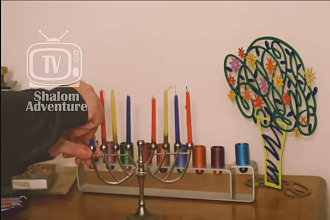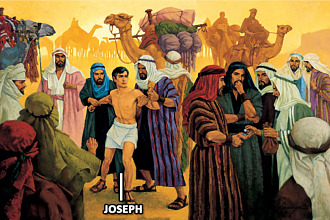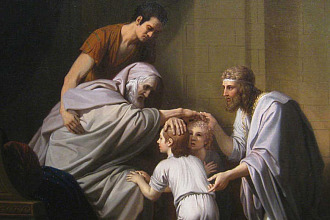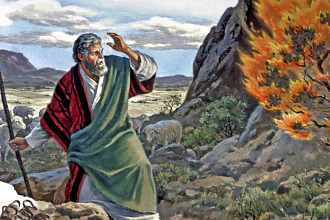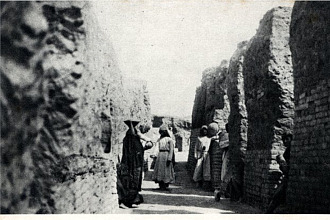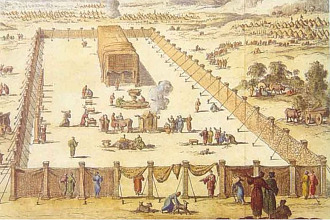Parasha for the Week: Vayashev: Genesis 37:1 – 40:23
Haftarah for the Week: Amos 2:6 – 3:8
Besorat Yeshua: Mark 12:35 – 13:4
Overview
Yaakov makes Yosef a fine tunic of multi-colored woolen strips.
Yosef exacerbates his brothers’ hatred by recounting prophetic dreams of sheaves of wheat bowing to his sheaf, and of the sun, moon and stars bowing to him.
The brothers indict Yosef and resolve to execute him. When Yosef comes to Shechem, the brothers relent and decide, at Reuven’s instigation, to throw him into a pit instead.
Reuven’s intent was to save Yosef. Yehuda persuades the brothers to take Yosef out of the pit and sell him to a caravan of passing Ishmaelites.
Reuven returns to find the pit empty and rends his clothes. The brothers soak Yosef’s tunic in goat’s blood and show it to Yaakov, who assumes that Yosef has been killed by a wild beast.
Yaakov is inconsolable. Meanwhile, in Egypt, Yosef has been sold to as a slave to Potiphar.
Yehuda’s son Er dies. Onan, Yehuda’s second son, then weds Er’s wife Tamar. He too dies as punishment for preventing his wife Tamar from becoming pregnant.
When Yehuda’s wife dies, Tamar resolves to have children through Yehuda, as this union will found the Davidic line culminating in the Mashiach.
Meanwhile, Yosef rises to power in the house of his Egyptian master.
Joseph’s extreme beauty attracts the unwanted advances of his master’s wife. Enraged by his rejection, she accuses Yosef of attempting to seduce her, and he is imprisoned.
In prison, Yosef successfully predicts the outcome of the dream of Pharaoh’s wine steward, who is reinstated, and the dream of Pharaoh’s baker, who is hanged. In spite of his promise, the wine steward forgets to help Yosef, and Yosef languishes in prison.
"How to make Peace?”
Yosef’s brothers were envious of him. The Torah tells us: “And they hated him and they were not able to speak to him for peace.” (Genesis 37:4) What can we learn from this verse? Rabbi Yonoson Eibeshutz commented that it is possible that if the brothers would have spoken the matter over with Yosef they would have been able to make peace. The problem was that they were not talking to each other. This is what frequently happens when people are in the midst of a feud. One does not want to listen to the other. However, when one person tells another that how he perceives that the other person wronged him, the other person might apologize and accept upon himself not to do it again. (This works even better if the one initializing the conversation can apologize for something that he did to the other person.)
If people involved in a heated dispute will talk things over with each other calmly, they will often see that they have nothing to argue about. Even if they still disagree in the end, the heavy emotionalism will be greatly diminished. When you hear clearly how the other person views the situation, you will see why he thinks as he does and you yourself will look at it differently.
When you are involved in a dispute with someone else, try to talk things over with him/her in a calm manner. It is important to repeat over the other person’s position. Keep asking, “Is this and this what you mean?” By doing this, much harm will be avoided!
"Reuven tried to save Yosef"
The Torah says: “one brother said, behold this dreamer (Joseph) is coming” (Gen. 37:19) They were concerned that Joseph was trying to usurp the birthright from Reuven as expressed in Joseph’s dreams of the family bowing to him. Reuven, himself, however, tried to save Joseph from their hands. The Torah states: “Reuven heard and he saved him from their hands. he said, ‘Let us not hit a mortal blow.’ Reuven said to them, ‘Do not shed blood. (Gen. 37:21-22).
"Yaakov and Yosef"
The Talmudic sages point out that whatever happened to Yaakov also happened to Joseph. Their lives were a mirror image of each other.
- Yaakov’s mother didn’t give birth for many years, so too Joseph’s mother, Rachel; Yaakov’s mother had a difficult childbirth, so too Joseph’s mother.
- Yaakov’s mother had two sons, Rachel also had two sons;
- Yaakov was a shepherd, so too Joseph;
- Yaakov received the birthright from his brother, Joseph also was given his brother’s birthright;
- Yaakov was hated by his brother, Joseph was also hated by his brothers;
- Yaakov was away from his father’s house, so too Joseph was away in Egypt;
- Lavan, for whom Yaakov worked, was blessed with great wealth in Yaakov’s merit, Joseph’s master was also blessed with great wealth in his merit;
- Yaakov married outside Israel, Joseph also, unlike his brothers, married his wife in Egypt;
- Yaakov’s blessings came through a dream, Joseph was made ruler of Egypt through a dream;
- Yaakov made his children promise that they would take him out of Egypt and bury him in Israel, Joseph also made his brother’s promise that he would be buried in Israel.
HAFTARAH Amos 2:6 – 3:8
Parasha: “Come, let us sell him to the Ishmaelites... His brothers agreed. When some Midianite traders passed by, they drew Joseph up, lifting him out of the pit, and sold him to the Ishmaelites for twenty pieces of silver. And they took Joseph to Egypt.” (Genesis 37:27-28).
Haftarah: “Thus says the LORD: For three transgressions of Israel, and for four, I will not revoke the punishment; because they sell the righteous for silver, and the needy for a pair of sandals” (Amos 2:6).
Parasha: The first installation of Israelites in Egypt “Now Joseph was taken down to Egypt, and Potiphar, an officer of Pharaoh, the captain of the guard, an Egyptian, bought him from the Ishmaelites who had brought him down there.” (Gen. 39:1)
Haftarah: Egypt is mentioned in our hafatara text. “Also I brought you up out of the land of Egypt, and led you forty years in the wilderness, to possess the land of the Amorite. And I raised up some of your children to be prophets and some of your youths to be nazirites. Is it not indeed so, O people of Israel? says the LORD.” (Amos 2:10-11).
Besorat Yeshua Mark 12:35 – 13:4
Parasha: Yosef received a dream to tell him that he is going to have a special ministry, he will be the savior of his people “Joseph had a dream, and he told it to his brothers,” (Gen. 37:5-6).
Besorah: Y’shua is in the Temple, he came as the Son of David, as the Messiah, the Savior of His people, that’s why during His ministry He tried to open the eyes of his auditors: “While Y’shua was teaching in the temple, he said, “How can the scribes say that the Messiah is the son of David?” (Mark 12:35).
Parasha: It is difficult to accept that we need a Savior. How can you be what you say you are? We have seen you as a baby and now you want to reign over us… Yosef’s “brothers said to him, “Are you indeed to reign over us? Are you indeed to have dominion over us?” So they hated him even more because of his dreams and his words.” (Gen. 37:8)
Besorah: Y’shua was sent to save us. Yet some had a hard time accepting Him.







